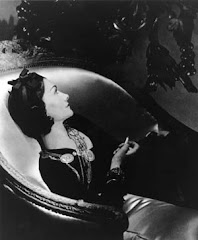On the sad death of Oliver Postgate, aged 83
This was voted the most popular children's television series of all time by British viewers. Note the state of the art animation.
Tuesday, 9 December 2008
Fabric care from the Bagpuss mice
Posted by
Linda Grant
at
09:32
6
comments
![]()
![]()
![]()
![]()
Labels: video
The Bethnal Green Bambinos and some reflections on Englishness
While matters proceed on the Harry front, in the meantime here is a little something going on at George Szirtes place. A clip from one of my favourite films, Passport to Pimlico, with a little light music from the Bethnal Green Bambinos. Stick with it so you can see what life was like buying a dress for Miss Pimlico at the Palais on the ration.
As George says:
Much of the film is a recap of post-war conditions, but the core of it is about state versus locality, not so much who is who, but what is what; the small versus the great. Your first ties, the film firmly states, are to your neighbours and to history."
I loved it the first time I saw it, for much the same reasons as I loved Frank Capra films. They were instinctively egalitarian, democratic and generous, a kind of idyll. Tribal? Yes. Sentimental? Yes, that too. But it was a broad tribe and the sentiments were, it seemed to me, good sentiments. Such sentiments were what, I suspect, the war was popularly thought to be about.
Meanwhile, "... the most remarkable thing about the bream is when he's courting...
I came along with a piece I wrote some years ago about this very film:
Passport to Pimlico’ is a comic investigation of Englishness. Not Britishness, which is rarely mentioned. Britain is an institutional entity, it’s government, Home and Foreign Office; it runs the Empire. Englishness is what the characters feel themselves to be inside. The film’s most famous line encapsulates how people felt about their country in the immediate post-war years, after a struggle against both fascism abroad and the dreary restrictions of living entirely by the rule book. ‘We’re English,’ a woman says, leaning her head out of an upstairs window to shout to the Whitehall bureaucrats below, ‘we always were English and it’s just because we are English that we’re sticking up for our right to be Burgundian.’
Posted by
Linda Grant
at
07:42
2
comments
![]()
![]()
![]()
![]()
Labels: video
Subscribe to:
Comments (Atom)
